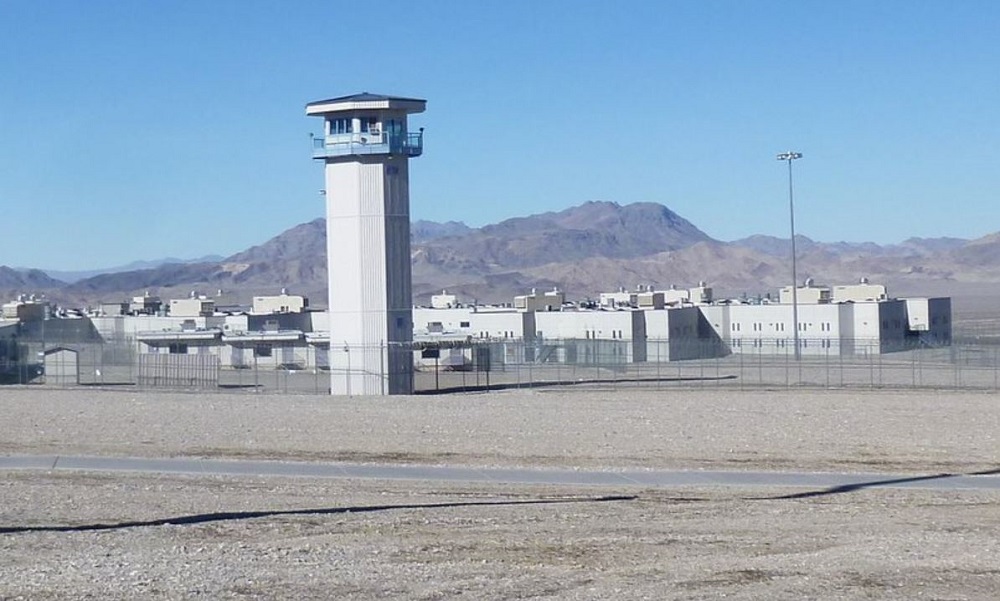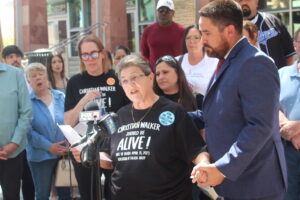6:42
News Story
Advocates, lawmakers laud progress on implementation of prison reforms
New laws limiting solitary confinement and ending medical copays have taken effect, but efforts to set up an independent prison ombudsman and expand medical services to women who are incarcerated are still ongoing, prison officials told lawmakers on Friday.
The 2023 Legislative Session saw substantial changes to the correctional system, which came following years of civil rights and prison advocacy groups criticizing the Nevada Department of Corrections for a lack of transparency.
NDOC Director James Dzurenda, along with advocacy organizations, gave an overview of how policies are being implemented at Friday’s Joint Interim Standing Judiciary Committee hearing.
Senate Bill 307 went into effect Jan. 1 and requires the department to implement the “least restrictive manner” when separating inmates from the general population, and doing so for the “shortest period of time safely as possible.”
State Sen. Melanie Scheible, who co-chairs the committee, said all the “legal standards outlined in SB 307 have been met” and that people are no longer “spending more than 22 hours a day in their cell.”
Scheible said she had been meeting with corrections officials and advocacy groups over the past several months to monitor implementation of the bill.
The bill requires a multidisciplinary treatment team, which includes a mental health clinician, to conduct a review after a person has been in solitary for 15 consecutive days, which Scheible said is also happening.
Dzurenda said the long-term goal was to “abolish solitary confinement permanently in the state of Nevada,” though he said NDOC still could use other forms of “segregation” that is used for discipline or out of safety concerns for other inmates.
Jodi Hocking, the founder of the prisoner advocacy group Return Strong, called SB 307’s passage “a phenomenal bill that made historical strides” but added there was still work to be done around understanding the use of facility lockdowns and other methods to segregate certain individuals.
“I just want to be clear that we are super ecstatic about the work that did happen but there is still a long way to go,” Hocking said. “I don’t want it to seem like we’re done with it. Check mark for us.”
Hocking applauded the overall changes that have happened with the department, as well as the policy reforms that have been won, but said there is always room for improvement.
“It has really been a tremendous improvement in openness, transparency and communication going on between the department and stakeholders,” Hocking said.
Adding additional staff, Dzurenda said, has enabled the department to implement legislation.
Dzurenda previously served as the director until 2019.
His successor, and predecessor, Charles Daniels, had received criticism on multiple fronts, from shoddy Covid protocols to predatory deductions from inmate bank accounts. Daniels was asked to resign by former Gov. Steve Sisolak in fall 2022.
When Dzurenda returned to the position in 2023, the department had an overall 39% staff vacancy rate, which was higher at some locations. Ely State Prison Facility had a 52% vacancy rate while Lovelock Correctional Center had a 49% rate.
Dzurenda said the department has hired 100 additional correctional officers since October and are looking to hire 400 more officers by the end of the year.
He said the goal was to see the vacancy rate drop to 10% by the start of the 2025 Legislative Session.
From hygeine products to ‘backdoor taxes’
Other updates on newly enacted corrections policies included:
Assembly Bill 292 expanded medical and behavioral health services for women, including providing unlimited feminine hygiene products upon request.
The department eliminated costs for hygiene items.
Dzurenda said NDOC didn’t receive any additional funds to implement the bill despite telling legislators how much it would cost..
“We are working on the funding for that so we comply by the end of the year with all the women’s services mentioned in the bill, which is the mammograms, pap smears and also gynecological exams,” he said.
While Assembly Bill 452 added protections around prison visitations by requiring the department to notify families at least 72 hours prior to a visit being canceled, the legislation also establishes an independent ombudsman to provide oversight to the prison system.
The proposal to search for an independent vendor to serve as the ombudsman is scheduled to be discussed at an upcoming Board of Prison Commissioners meeting, Dzurenda said.
Once approved, there will be a committee to oversee the process and help select a vendor to run the office.
Dzurenda told lawmakers he plans to formally ask the ACLU of Nevada to have a representative on the committee.
Senate Bill 416, referred to as the cost of incarceration bill, limited marking up costs of hygiene items purchased by those incarcerated, ended medical copays and “man down” fees, when those incarcerated require emergency medical services.
The high costs of commissary items and medical expenses were typically footed by families of those incarcerated, which advocacy likened to a “backdoor tax” on families.
Nick Shepack, the Nevada States Deputy Director of the Fines and Fees Justice Center, said the bill is already expected to save “families an estimated $1.1 million a year.”
“There were more copays than we knew, including copays for prosthetics, which has now been eliminated,” Shepack said. “We have really helped people a lot.”
The organization discovered more fees those incarcerated pay, including purchasing their own equipment and certifications for prison jobs.
“If you take all the work equipment, the physical equipment, that we have records of, over the last nine years incarcerated individuals were charged almost $500,000,” Shepack said.
Shepack said the average culinary worker, who makes $463 a year, has to pay for ServSafe cards for culinary workers, which cost between $10 to $20.
“That can be anywhere from a month to three months pay for an individual,” he said. “There is no reason why the state should not be picking up the cost of these cards.”
Assembly Bill 121 mandated the director to submit a study “and any evidence or data” that justify the decision as well as required the department to refill prescriptions in a timely manner and ensure people who are incarcerated fill out medical release forms.
Adding protections around inmate mail came after the previous director attempted to prohibit certain mail, including greeting cards and colored drawings.
The idea was proposed to crackdown on contraband entering facilities, despite zero evidence showing the need for the restriction.
Hocking said there wasn’t any issue with implementing the sections around the mail reforms.
However, she said there were aspects of AB 121 “that aren’t being implemented as smoothly.”
The thought behind the legislation, she said, was to ensure medications were automatically refilled without people submitting a request with the medical department.
Our stories may be republished online or in print under Creative Commons license CC BY-NC-ND 4.0. We ask that you edit only for style or to shorten, provide proper attribution and link to our website. AP and Getty images may not be republished. Please see our republishing guidelines for use of any other photos and graphics.




